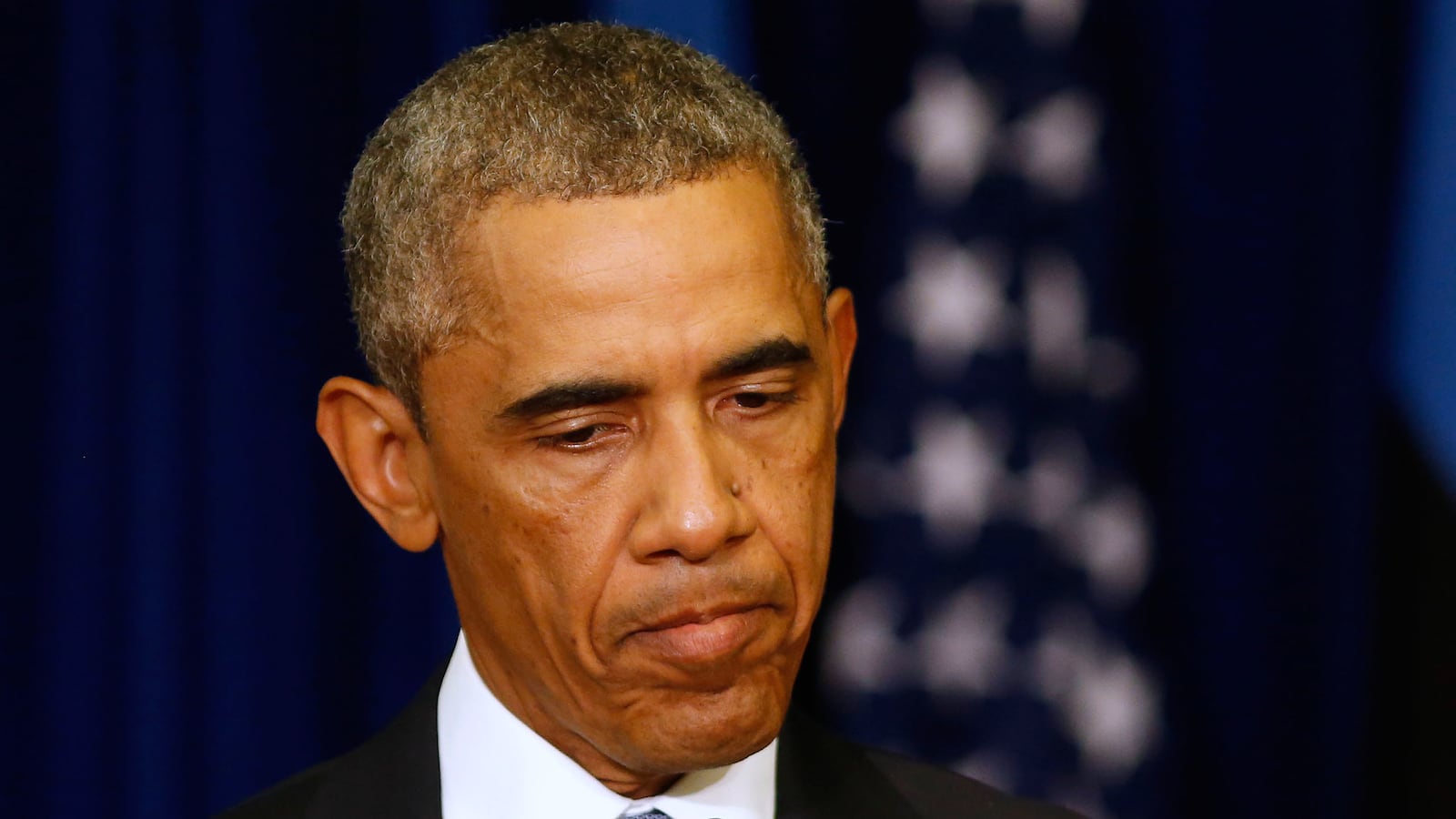The 2014 election should have really been spectacular for Democrats. They have so many key issues on their side, and the Republicans are offering just about nothing. (Unless you count saying “no” as something.) If not for one person, election night 2014 could’ve been marked by Democrats dancing for joy-maybe even twerking.
So who is this person? No, it’s not Reince Priebus, Ted Cruz, or even the right’s favorite duck hunter/policy advisor, Phil Robertson. It’s none other than the leader of the Democratic Party: Barack Obama.
Why? Because of Obama’s alarmingly low job approval ratings. Sure, in midterm elections the president’s political party tends to lose seats in Congress. But as John Sides, a political science professor at George Washington University told me, “There’s certainly a systematic relationship between the president's approval rating and the fortunes of his party's congressional candidates in midterm elections.”
We have even seen the president’s party pick up seats in midterms if he was riding high in the polls. For example, in the fall of 1998, the sixth year of Bill Clinton’s presidency, he had an approval rating of 66 percent. That year, largely because of public distaste at the GOP’s push to impeach Clinton and a strong economy, Democrats actually gained five seats. And in 2002, George W. Bush, still basking in that post-9-11 Churchill aura, had a 63 percent approval rating, and the GOP added six seats.
But between 1946 and 2010, when a President’s approval rating has been below 50 percent, his party has lost on average 36 seats in Congress. In large part that’s because there’s a lower turnout (around 40 percent) in midterms than in presidential elections, and a big chunk of these voters go to the polls to send a message to the president that they are dissatisfied with him.
We saw this very thing happen in the past two midterms. In 2006, Bush had an approval rating in the high 30’s in large part due to his mishandling of the Iraq war. This translated into Democrats seeing a net gain of 30 seats in House and six in Senate, taking control of both chambers.
In 2010, Obama had only a 45 percent approval rating thanks to a weak economy. What happened? The GOP reaped a whopping net gain of 60 seats in the House and six in the Senate.
In this election, however, we don’t have one dominant issue. Instead, we see a host of issues of concern, most favoring Democrats. For example, the top issue mentioned by voters in this election cycle is immigration. Well the Democrats rule on this one. Polls find a solid majority of voters support the Democrats’ goal of offering a pathway to citizenship for undocumented immigrants. Same goes for supporting Obama’s decision to not deport the so-called Dreamers, the children of undocumented immigrants.
In stark contrast, Republican leaders not only for most part oppose a pathway to citizenship, deeming it “amnesty,” but the House Republicans also voted almost unanimously last month to deport all undocumented immigrants, including the Dreamer children.
Another Democratic issue that has wide support (70 percent) is raising the federal minimum wage from its current level of $7.25 an hour. However, Senate Republicans blocked a vote on the issue just a few months ago. And GOP Senate candidates in key races, like Joni Ernst in Iowa and Mitch McConnell in Kentucky, oppose raising it even though a majority of voters in both states agree with the Democratic position.
And the list goes on. Poll after poll finds a majority of Americans on the same side as Democrats on a litany of issues such as addressing income inequality, requiring employers to pay for the full cost of birth control, marriage equality, and mandating universal background checks for all gun purchasers.
In a vacuum (translation: but for Obama), this could be a killer year for Democrats. But the reality is that Obama will play a big role in November. And not a good one if you're a Democrat.
Currently Obama has a 42 percent approval rating—alarmingly that’s lower than he had in 2010 when the Democrats were pulverized. And Obama’s job approval on foreign affairs currently stands at anemic 36 percent, which is especially troubling given current headlines. Plus nearly 70 percent of Americans think our country is heading in the wrong direction.
In all likelihood, Democrats should brace for an ugly election night. I’m talking “Peanut” ugly, the dog who recently won the ugliest dog contest.
But don’t despair Democrats. You are very well positioned for 2016. The issues that currently favor Democrats are very likely to be pivotal ones come 2016. Plus voters will be electing a new president, not sending a message to Obama.
And here’s a little bit more uplifting news for Dems. While it’s likely they will lose the Senate this November, they’ll more than likely regain it in 2016. Of the 34 Senate seats up in 2016, 24 are Republican with many in states that could easily go back to the Democratic column, such as Illinois, Pennsylvania, and New Hampshire. In contrast, the Democratic senators in 2016 tend to be in safer seats.
Bottom line: Barring something truly remarkable– I’m talking of the magnitude of Obama killing Bin Laden again or a cornucopia of “legitmate rape” type Republican gaffes- Democrats will take a pounding in November. But the Democrats should hang on to their dancing shoes because come 2016, they might be twerking in joy.






